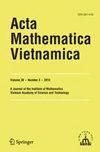亚纯函数微分多项式的零
IF 0.3
Q4 MATHEMATICS
引用次数: 0
摘要
设f是\(\mathbb{C},\)k上的超越亚纯函数,k是正整数,并且\(Q_{0},Q_{1},\dots,Q_{k})是\(\ mathbb{C}[z]\)中的多项式。在本文中,我们将证明f的不同极点的频率由f中的微分多项式形式\(Q_{0}(f)Q_{1}(f^{\prime}){\dots}Q_{k}(f^{(k)})\)的零的频率控制。我们还将证明f中的微分多项式形式\(Q_{0}(f)Q_{1}(f^{\prime}){\dots}Q_{k}多项式。因此,我们的工作是Mues猜想和Goldberg猜想对更一般的微分多项式的推广。本文章由计算机程序翻译,如有差异,请以英文原文为准。
Zeros of Differential Polynomials of Meromorphic Functions
Let f be a transcendental meromorphic function on \(\mathbb {C},\) k be a positive integer, and \(Q_{0},Q_{1},\dots ,Q_{k}\) be polynomials in \(\mathbb {C}[z]\). In this paper, we will prove that the frequency of distinct poles of f is governed by the frequency of zeros of the differential polynomial form \(Q_{0}(f)Q_{1}(f^{\prime }){\dots } Q_{k}(f^{(k)})\) in f. We will also prove that the Nevanlinna defect of the differential polynomial form \(Q_{0}(f)Q_{1}(f^{\prime }){\dots } Q_{k}(f^{(k)})\) in f satisfies
$$ \sum\limits_{a\in\mathbb{C}}\delta\left( a,Q_{0}(f)Q_{1}(f^{\prime}){\dots} Q_{k}\left( f^{(k)}\right)\right)\leq 1$$
with suitable conditions on k and the degree of the polynomials. Thus, our work is a generalization of Mues’s conjecture and Goldberg’s conjecture for the more general differential polynomials.
求助全文
通过发布文献求助,成功后即可免费获取论文全文。
去求助
来源期刊

Acta Mathematica Vietnamica
MATHEMATICS-
CiteScore
0.90
自引率
0.00%
发文量
23
期刊介绍:
Acta Mathematica Vietnamica is a peer-reviewed mathematical journal. The journal publishes original papers of high quality in all branches of Mathematics with strong focus on Algebraic Geometry and Commutative Algebra, Algebraic Topology, Complex Analysis, Dynamical Systems, Optimization and Partial Differential Equations.
 求助内容:
求助内容: 应助结果提醒方式:
应助结果提醒方式:


